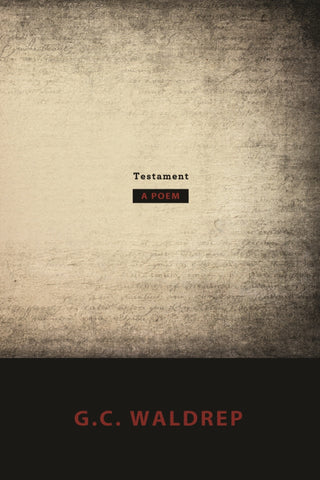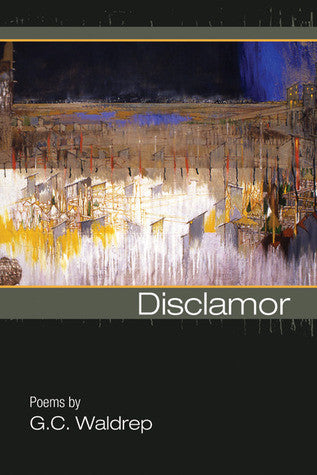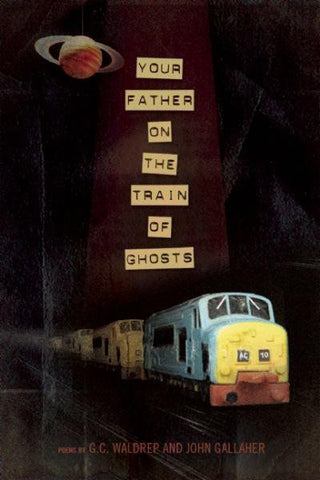
About This Title
In this book-length poem, G.C. Waldrep addresses matters as diverse as Mormonism, cymatics, race, Dolly the cloned sheep, and his own life and faith. Drafted over twelve trance-like days while in residence at Hawthornden Castle, Waldrep responds to such poets as Alice Notley, Lisa Robertson, and Carla Harryman, and tackles the question of whether gender can be a lyric form. Intimately autobiographical, Waldrep’s fifth book masterly takes its own place in the American tradition of the long poem.
Excerpt from “Part ll
Notes from a City Silence Fled”
How speech works: the body co-opts
language and vamps a matinee performance,
i.e. the body holds language up
in front of itself, as if it were a mask.
Sometimes language, like napalm,
melts into the face, throat, chest,
genitals of the speaker. Unlike napalm,
this can seem painless. Some people
don’t notice until the performance
is over. Some people never notice.
Sometimes a mask keeps talking
long after the negotiating body
has retired, fallen away or disappeared.
(Call this literature.)
Sign language: merger of body
with mask. It’s why some of us find
the deaf so threatening, so Other.
A gender we haven’t sexualized yet,
a plane crash dooming an orchestra.
Here, listen to this, you say.
I take the headphones. It sounds
like a bunch of planets talking.
It is a bunch of planets talking, you say.
Sometimes the world impresses,
merely through superior fidelity
Praise for Testament
“In a theology of an altered trinity—eye, bee, flower—Testament asks readers, Can gender be a lyric form? An epic paean to the moral imagination, Waldrep’s book-length poem ‘verbs’ or predicates the corporeal and invisible through languages of faith, light, history, and mystery: ‘Aurora dentata. Light with teeth,’ or 'the body as a museum for light.’ With the attentive rigor of an exegesis scholar in ever-shifting contexts of a postmodern world, Waldrep also parses our relationship to nature as one of symbiotic bifurcations: ‘The pastoral wanders / about looking for us. Without us / the pastoral is nothing: metamorphic occlusions, / some generative organs of flowers & trees.’ Versed in sundry fields of knowledge—physics, micrographia, hermeneutics, and slippery modes of knowing in our age of indeterminacy—Waldrep’s latest book still testifies to ‘this oriency, this brilliance, this luster.’”—Karen An-hwei Lee
“G.C. Waldrep knows the problem: ‘First you make the tools / out of nothing. And from the tools, / you must make nothing. Then, out of nothing, / you must remake the tools.' Easier said than done. Of course, what Waldrep shows, in this book of sly mysticism and ontological devotion, is that all saying is a kind of doing, pulling up with the shovel of words those artifacts that also deepen the hole from which they’re dug. This long poem refuses to divorce phenomenological depth away from those daily surfaces that in their dazzle blind us to ideal truths; it also refuses to let ‘ideal truths’ occlude those swerves into error the human heart makes as its hopeful sacrifice to whatever a living faith might be. Testament gives me some half-lit glimpse of such a faith. It’s one that trusts the ancient modes of thought and feeling wander through the same labyrinth we find ourselves in, reciprocal bewilderment, reciprocal hope that each to the other lends some meaning neither possesses itself. Ironic without succumbing to mere irony, faithful without surrendering to dogma, Waldrep offers us his most necessary book, one that asks with us that question we fear ourselves to ask: how is this real, any of it, all of it, faith, language, light, history, and that cipher that collects them all, the human heart.”—Dan Beachy-Quick
“Here are predicates with no apparent subject, as if work were being done, masterless. Just so capital and its dresses move behind the scenes and before our very eyes. The mind as separate, severed from the world. But song too can be agentless, moving sometimes of its own accord. These poems posit not just language as labyrinth (in which we seek the connecting thread), but also, importantly, language as plea for scale, to keep in focus both the golden sensorium lacing the body and the laws and forces hovering over it.”—Eleni Sikelianos
Publication Date: May 12, 2015
ISBN: 978-1-938160-63-9
© BOA Editions, Ltd. 2015



